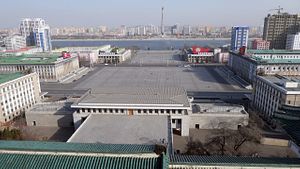North Korea has imposed a five-day lockdown on Pyongyang, according to a post published by the Russian Embassy in Pyongyang on Thursday. The lockdown will last through Sunday, demonstrating Pyongyang’s efforts to prevent a second outbreak of COVID-19 from happening within the country.
Korean Central News Agency, one of the North’s main state-controlled media, did not mention COVID-19 specifically, but noted that the authorities “redoubled” efforts to “contain the outbreak and spread of infectious diseases.”
“All sectors and units are taking foresighted measures to increase the efficiency of anti-epidemic work while firmly maintaining the anti-epidemic atmosphere throughout society in order to cope with the daily-worsening world health crisis,” KCNA reported on Thursday.
When the COVID-19 pandemic began in late 2019 in China, there were concerns that North Korea could be fatally impacted by the infectious disease, considering the poor state of its healthcare system. The regime took drastic measures to prevent entry of the virus, such as closing the borders with China, by far North Korea’s largest trade partner. For two years after the pandemic began, North Korea claimed to have no cases – even without vaccines and medical treatments.
In May 2022, however, North Korea announced its first outbreak of COVID-19, sparking worries from outside medical experts due to the possibility of a massive number of North Koreans being incapacitated. North Korean leader Kim Jong Un was also believed to be infected with the virus on the basis of the state media reports and his sister’s public remarks.
Three months later, North Korea declared victory over COVID-19. Pyongyang never released any data on confirmed cases of COVID-19 during this three-month struggle; instead, the government only counted those who had a fever, which is one of the common symptoms of COVID-19.
Kim Yo Jong, the powerful sister of Kim Jong Un, claimed that balloons carrying anti-Kim regime leaflets were the main cause of the outbreak, leading her to issue threats against Seoul. The leaflets were launched by a North Korean defector-led South Korean civil organization in April, weeks before the North confirmed its first outbreak. However, medical experts said the infection would not have been transmitted from an object to a person.
Since then, North Korea has loosened its anti-pandemic measures and partially reopened its borders. That raises the possibility of Pyongyang having new cases of COVID-19. Based on satellite imagery analysis published by 38 North, a Washington-based center monitoring North Korea, however, North Korea appears to have preemptively locked down Pyongyang to prepare for a military parade – which is expected to be held on February 8 to celebrate the 75th founding anniversary of the Korean People’s Army (KPA).
Seventeen days before North Korea confirmed its first COVID-19 outbreak, there was a large-scale military parade held in Pyongyang on April 25, 2022. In this context, Pyongyang appears to have reimposed aggressive anti-pandemic measures to prevent a second outbreak in the wake of the military parade.































